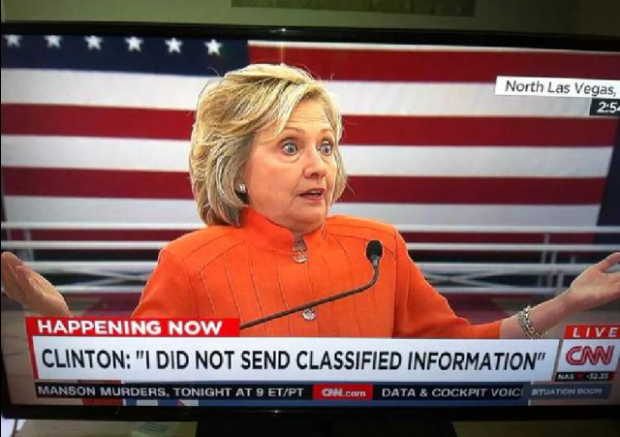 My secret is contrarianism. Since the conventional wise men of the corporate mainstream media are almost always wrong, you’ll almost always be right if you bet against them.
My secret is contrarianism. Since the conventional wise men of the corporate mainstream media are almost always wrong, you’ll almost always be right if you bet against them.
The MSM take on Donald Trump is a rare exception to the rule. They’re scared and so am I. They’re right to be frightened. He’s an unconscious fascist, less like Hitler the careful schemer, more like Adolf’s mentor Mussolini, who cobbled together a little bit from the socialist left and a lot from the nationalist right, winged it as he noted which lines got the most applause, and repeated those.
The trouble with Trump isn’t his policies. He hardly has any. Those he has are so vague as to be laughable (see: the Mexican-financed border wall, mass deportations, etc.)
His temperament is the threat. Hillary Clinton hasn’t met a war she didn’t like, but it’s easy to imagine Trump starting one — maybe a big one — accidentally. Trump has so much contempt for the system, the job he’s running for, and the American people, that he hasn’t bothered to study up on the issues. If he took real estate this seriously, he would have gone bankrupt even more often.
Here’s some irony: America finally elects the magic businessman as president — which we’ve been told for years would be awesome — and securities markets tank in reaction to the uncertainty he creates.
Trump, used to getting his way all the time, is a bully. A president convinces. An authoritarian orders you. Do what he says, or else. This November, nothing less than the American political system is at stake.
So it’s time to get real.
The establishment types are still in denial. Wake up, idiots!
At this writing, Trump is my odds-on favorite to win in November. Things could change. But that’s where we’ve been for months and where we are now.
Because they didn’t think Trump could win the nomination, the party’s efforts to stop him have come way too little, way too late. Mitt Romney 2.0? Paul Ryan? Seriously?
Looking back, pressuring Trump and the other candidates promise to support the eventual nominee and forswear a third-party/independent candidacy rates as one of the stupidest political maneuvers of all time. Now the Republicans are stuck with the dude.
Not that the Democrats are blameless. Barring a miraculous EmailGate-related indictment or the eruption of some new scandal-in-waiting, Hillary Clinton will probably be the Democratic nominee. Thank you, DNC! And she’ll be a disaster. Head-to-head match-ups have consistently shown that she’s weaker against Trump than Bernie Sanders.
Trump is hardwired to find the weak spots in his opponents. He’ll have a field day demolishing Clinton’s candidacy, which is constructed on a pair of fantasies: that her long resume equals a list of impressive accomplishments, and that her record of supporting right-wing wars and trade agreements means she’s secretly a progressive longing to race out of the gate to keep “fighting for us.” Remember what he did to Little Marco Rubio.
Trump will blow up Hillary’s BS over and over and over. And there’s a lot of BS to blow up.
Hillary’s support is wide but shallow. Sure, some Bernie voters will dutifully Feel the Hill. But many Democrats, the ones who got into the Bern because they couldn’t abide Clinton, will not. DINO Hillary is to Trump’s right on war and trade and probably on Israel too. The #BernieorBust movement could leave enough progressives sitting home on election day or casting their votes for the Green Party’s Jill Stein to put Trump into the White House.
Should/can Trump be stopped? Yes, but not by the Republican Party. The GOP’s Stop Trump stampede — the anguished editorials, the cable-news rants, the pompous insider scolds, tens of millions of dollars in SuperPAC-funded attack ads that even smear his wife as a slut — is counterproductive, playing into the framing of a guy who sells himself as an establishment pissing-off outsider.
The Stop Trump movement within the GOP is undemocratic to the point of making me want to retch. Trump has a commanding lead against rival Ted Cruz (680 delegates to 424, 37% of the popular vote to 27%). Considering that Trump began the race against 18 other candidates, the establishmentarian talking point that he can’t get 50% of the vote is absurd. 37% is a commanding lead, and talk of pulling out some nothing guy who didn’t even run (Ryan, Romney) in second-round voting at the Republican convention is an insult to those who voted for Trump and to democracy itself.
The raison d’être for GOP anti-Trumpism is insane: he’s not a “real conservative” — this proto-fascist, they say, is too far left for their party.
If Republicans are serious about stopping Trump, they should pledge to support the Democratic nominee for president — with their votes, their PR machines, their SuperPACs and campaigning in person.
If the Democrats are serious about stopping Trump, they should Stop Hillary.
(Ted Rall is the author of “Bernie,” a biography written with the cooperation of Democratic presidential candidate Bernie Sanders. “Bernie” is now on sale online and at all good bookstores.)




 The fight between Apple and the FBI has been framed as an epic battle between big tech and big government. Apple, says the Obama Administration, is siding with “
The fight between Apple and the FBI has been framed as an epic battle between big tech and big government. Apple, says the Obama Administration, is siding with “